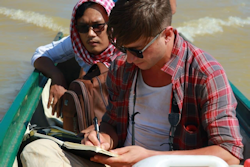The Cambodian government has shown its hypersensitivity to critical independent journalism by using spurious visa issues to ban British environmental reporter Gerald Flynn from Cambodia.
 |
| In 2021, Gerald Flynn, at right, visited communities affected by the construction of Cambodia's Lower Sesan II hydropower dam in Stung Treng province. Photo courtesy of Mongabay. |
The Society of Environmental Journalists joins more than 20 journalism and human rights groups in Asia and worldwide in condemning this arbitrary decision and calls on the government to let him return to Cambodia to continue reporting on the country’s serious environmental issues.
Flynn, a U.K. citizen, has lived and worked in Cambodia for several years, most recently for Mongabay, the U.S.-based environmental news outlet that has covered rampant deforestation there.
But upon returning Jan. 5, 2025 from a brief visit to Thailand, Flynn was stopped at the airport and denied re-entry. Immigration officials informed him he was “permanently banned” from Cambodia, claiming he had acquired a visa under false pretenses, and put him on a flight back to Bangkok.
Yet he obtained his visa from a reputable visa agent, according to Mongabay, and he has consistently held a valid government-issued press pass for the past five years, even serving as president of the Overseas Press Club of Cambodia. The news outlet noted that Flynn’s re-entry ban came just weeks after the airing of a French documentary in which he was featured that alleged illegal logging of Cambodian forests supposedly preserved for carbon credits.
Cambodia’s environment ministry responded that the film “spread false information.” It called on media outlets to “report the truth and respect the journalism profession.” But it appears that by banning Flynn the government has demonstrated its own lack of respect for press freedom.












 Advertisement
Advertisement 



